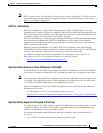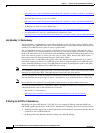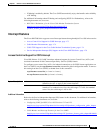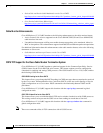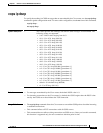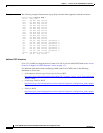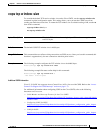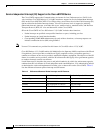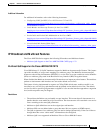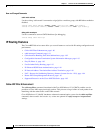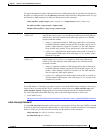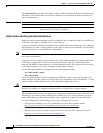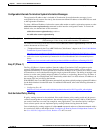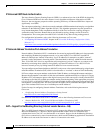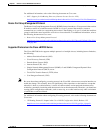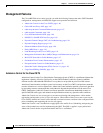
1-79
Cisco uBR7200 Series Universal Broadband Router Software Configuration Guide
OL-2239-05
Chapter1 Overview of Cisco uBR7200 Series Software
cops tcp window-size
Additional Information
For additional information, refer to the following documents:
• Configuring COPS for RSVP, Cisco IOS Versions 12.2 and 12.3
http://www.cisco.com/en/US/products/sw/iosswrel/ps1835/products_configuration_guide_chapter
09186a00800b75c9.html
• Cable Monitor and Intercept Features for the Cisco CMTS
http://www.cisco.com/en/US/products/hw/cable/ps2217/products_feature_guide_chapter09186a00
8019b571.html
• PacketCable and PacketCable Multimedia on the Cisco CMTS
http://www.cisco.com/en/US/products/hw/cable/ps2217/products_feature_guide_chapter09186a00
8019b576.html
• Cisco PacketCable Primer White Paper
http://www.cisco.com/en/US/netsol/ns341/ns121/ns342/ns343/networking_solutions_white_paper
09186a0080179138.shtml
IP Broadcast and Multicast Features
The Cisco uBR7200 Series supports the following IP broadcast and Multicast feature:
• Multicast QoS Support on the Cisco uBR7246VXR CMTS, page 1-79
Multicast QoS Support on the Cisco uBR7246VXR CMTS
Cisco IOS Release 12.3(13a)BC introduces support for Multicast downstream QoS feature. This feature
t provides the ability to assign static mapping to a multicast group. The Multicast downstream QoS
feature uses the existing infrastructure (DOCSIS 1.1 service flow) to assign a multicast service identifier
(SID) to a multicast group used in the Baseline Privacy Interface (BPI) encryption feature.
When disabled, the Multicast downstream QoS feature does not impact any other features. The multicast
packets to downstream cable interfaces are sent to the default service flow.
This feature is being implemented in response to CSCeg22989 which states, multicast traffic is not
classified to any service flow, and therefore ends up queued on the default service flow. The default
service flow has no specific QoS guarantees assigned to it. So once the interface approaches congestion
level, multicast packets may be dropped.
Restrictions
• The multicast definitions are per-bundle, not per interface. This means that all downstreams in a
bundle share the same multicast to QoS association. The downstreams will create their own service
flows according to the same QoS parameters.
• Multicast to QoS definitions can not be assigned per sub-interface
• Multicast SIDs are not deleted when a group becomes idle (no response to IGMP reports).
• The QoS assignments for a multicast group can not be changed dynamically. If the user wishes to
change them then a new “cable match” command must be configured.
• Multicast QoS is not supported on Multicast Echo on Cisco uBR10012 router.



